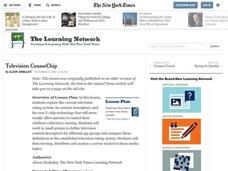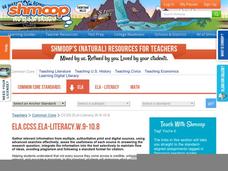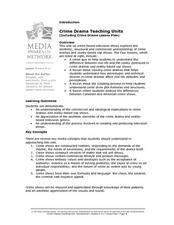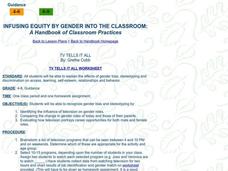Curated OER
Television CensorChip
Explore the current television rating system, its content descriptors, and the new V-chip technology that more readily allow parents to control their child's television viewing. Help learners develop a survey that will determine the pros...
Media Smarts
Teaching TV: Critically Evaluating TV
Mercer Mayer's There's a Nightmare in my Closet creates the framework for a specific discussion of nightmares generated by TV and a more general discussion of other emotions evoked by programs.
Curated OER
Media Literacy: TV - What You Don't See!
Students examine how to evaluate what they are watching on television. They discuss hip hop music videos, compare/contrast them to other types of music videos, write a letter or press release about promoting positive teen stories, and...
Curated OER
TV Tells it All
Young scholars discuss the concept of gender bias and stereotyping. In this social science lesson, students determine what the influence of television on gender roles represents and compares the chage in gender roles of today to those of...
Curated OER
Literary Criticism
Students evaluate and debate whether movies, television shows, and other mass media cause violent behavior in students and whether books are the same as or different from these other media in their potential for causing violent behavior...
Shmoop
ELA.CCSS.ELA-Literacy.W.9-10.8
Demonstrate the importance of evaluating and citing sources. Pupils can complete the suggested assignment provided here, or one of your choosing, while focusing on checking that the resources are credible and citing those sources...
Media Smarts
Forensic Science Crimes Dramas
How do TV shows present criminology—is it realistic? High schoolers research crime dramas and participate in class discussion about topics such as who exists as the target audience and the values the shows communicate. They also research...
Curated OER
Science TV: Making it Real
Students explore the ways science is presented in a children's television show. Students conduct internet research, and then create and design a skit that highlights the problem-solving process.
Curated OER
Panther Prime Time Morning News Show
Students write, direct, produce and star in a morning news show to be aired live to the student body three days a week. Fourth graders are the show's anchors amd fifth graders man the production equipment.
Curated OER
Children's Media and Censorship
High schoolers form opinions about children and television censorship after analyzing literature. They complete a journal writing activity to identify the topic and make a list of inappropriate television shows for children. Next, they...
PBS
Broadcast News
Just because a story is on the news doesn't mean it's being presented fairly. Analyze news broadcasts with a instructional activity focused on evaluating television journalism. At home, kids watch a news show and note the stories...
Missouri Department of Elementary
The Clique
Mean girls and bully packs are favorite topic for films and TV shows that focus on the destructive power of cliques. High school freshmen are asked to reflect on both the positive and negative aspects of cliques by reading a short...
Curated OER
Is the Brady Bunch Biased
Learners examine gender bias on television and in the movies. In this social science lesson, students watch various shows and when an instance of stereotypical behavior, or gender bias situation occurs, learners think about the problem....
Curated OER
Crime Drama Teaching Units
Investigate the nature of crime dramas on television. What exactly are they trying to portray? Questions and a comparison chart support learners as they watch shows from Canada, Great Britain, and the United States. An oral presentation...
Curated OER
Estimation and Your TV Diet
Students develop estimation skills by using real life situations. In this estimation lesson students collect data about their television watching habits. They make hypothesis about the number of hours they watch, how many commercials,...
Curated OER
Smoking On TV and In Films
Students identify and discuss young peoples' attitudes towards smoking and the power of TV and film on their daily lives. They critically evaluate comments about tobacco smoking. In addition, they place on a graph the reasons people give...
Curated OER
Background for The Outsiders: the 1960s
As background for a reading of S.E. Hinton’s The Outsiders, groups rotate through four stations (video, music, website, information) to gather information on the 1960s. In addition, they interview family members about the 1960s and...
Curated OER
TV TELLS IT ALL
Students identify the influence of television on gender roles and talk about how they are changing.
Curated OER
Keeping News Trustworthy
Students analyze media sources. In this media awareness lesson, students consider media outlets as businesses and discuss how they present information. Students keep media logs and analyze selected newspapers, magazines. or television...
Curated OER
Putting the Sitcom into Perspective
Students identify and compare similar characters and situations in stories and dramas from and about various cultures, illustrate with classroom dramatizations, and discuss how theater reflects life.
Curated OER
Fearing the Fear Factor
Students write a reaction paper on the topic: "Reality shows like 'Fear Factor' are dangerous/nothing to worry about because...." Students respond to the situation Akron, Ohio's First Energy Corporation being labeled irresponsible after...
Museum of the Moving Image
Evaluating Information: Focus on the 2008 Election
Just how true is the information contained in political ads? Determining the veracity of campaign ads from the 2008 presidential race is the focus of a instructional activity that introduces class members to several fact-checking resources.
Curated OER
Reality Check
Students evaluate different types of reality television programming in "focus groups" and then submit their opinions on this type of programming to a television network.
Cornell University
Forensic Science: Case of the Missing Diamond Maker
Someone stole a diamond-making machine. Who done it? Scholars use forensic science at six different stations to determine the culprit. They analyze fingerprints, use their senses, and complete chemistry experiments to determine the...

























